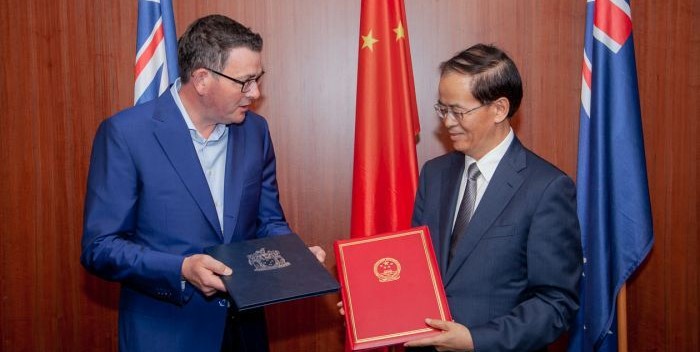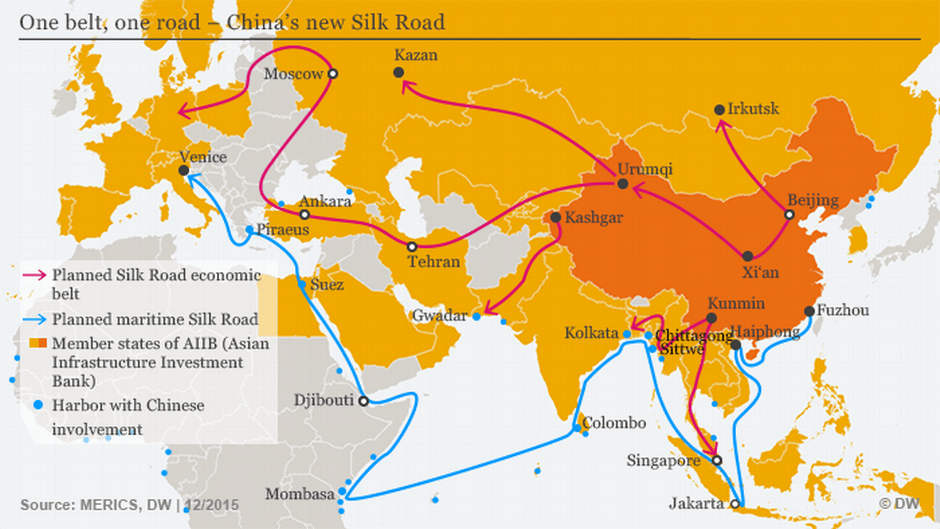Victoria’s deal with China a surprise
November 15, 2018 | Expert Insights

Victorian government’s decision to sign up to China’s controversial Belt and Road Initiative without consulting commonwealth has irked Australian Prime Minister Scott Morrison.
Background
The Belt and Road Initiative (BRI), also known as the One Belt One Road (OBOR) or the Silk Road Economic Belt and the 21st-century Maritime Silk Road is a development strategy adopted by the Chinese government involving infrastructure development and investments in countries. It is Chinese President Xi Jinping's plan to build a vast network of trade routes across the globe with high-speed rail into Europe, massive shipping ports throughout Asia and the Pacific, and free trade agreements with dozens of nations. China has pledged trillions of dollars over the past five years toward the constructions.
68 countries have signed up to President Xi Jinping's signature initiative.

Analysis
The release of Victoria's Memorandum of Understanding with Beijing over the controversial One Belt One Road initiative has received an adverse reaction from the Commonwealth. Prime Minister Scott Morrison of Australia was caught unawares by reports that the Victorian government had quietly sidestepped federal regulators and signed a deal with China at a time when intelligence officials are concerned that the latter is trying to exert undue influence in Australia.
Prime Minister Scott Morrison criticised Victorian Premier Daniel Andrews for signing the deal saying the foreign policy was the domain of the Commonwealth Government, and it sent "mixed messages" when state governments engaged directly with other nations.
Mr Morrison said, "I was surprised that the Victorian government went into that arrangement without any discussions with the Commonwealth government at all." He also said, "Or taking what would seem any advice from the Commonwealth government on what is a matter of international relations.” Mr Morrison also iterated that "They're the responsibilities of the Commonwealth government, and I would have hoped that the Victorian government would have taken a more cooperative approach to that process”.
The MOU was signed on October 8 and on request from Beijing kept a secret by the Andrews Government; but with pressure from the Coalition and a November 24 election looming, the document has been made public. On 25 October the Victorian premier, Daniel Andrews, finalised the MOU with the Chinese ambassador to Australia, Cheng Jingye, making Victoria the first and only Australian state to support President Xi Jinping’s global trade and infrastructure initiative.
The Victorian government in its defence said that it “consulted with the Department of Foreign Affairs and Trade (Dfat) during the MOU’s drafting process and Dfat have been provided with a copy”. “They know full well our policy on those issues and I thought that was not a very cooperative or helpful way to do things on such issues,” Mr Morrison said.
Daniel Andrews, the premier of Victoria, said the deal would bring Victoria’s businesses “one step closer to unlocking the trade and investment opportunities of China’s ambitious Belt and Road initiative.”
The federal government needs to clarify its position on whether Australian states are allowed to receive funding for Belt and Road projects. The federal government has also signed a memorandum of understanding with China, which it, too, has kept largely under wraps. In September, Steven Ciobo, then the trade minister, signed an agreement that would allow Australia and China to cooperate on infrastructure projects in third countries under the Belt and Road Initiative. The federal government has yet to make the details of that agreement public.
Victoria is already a strong trade partner for Beijing. In the last four years Victoria has tripled its share of Chinese investment in Australia, and nearly doubled Victorian exports to China, according to Mr Andrews. The Andrews Government sees Chinese expansion as an important opportunity for the state.
Assessment
Our assessment is Australia is concerned about China’s expansion into the Pacific region which may have strategic consequences and is taking very premeditated steps. The Andrews government on the other hands has cut the deal for politically opportunistic reasons because the deal comes two weeks before Victoria’s state election. We feel that this could be a precedent for China to engage directly with the state governments in other countries too.








Comments